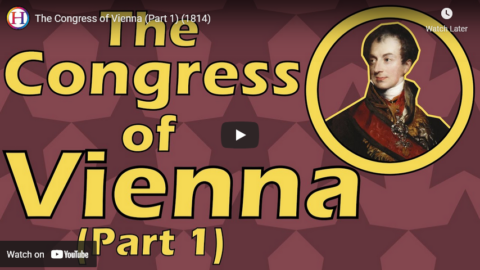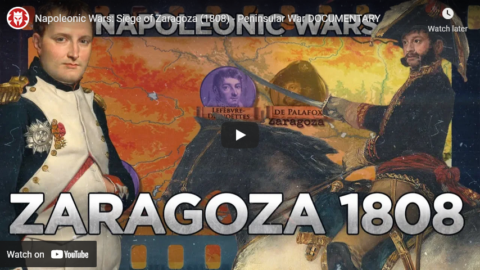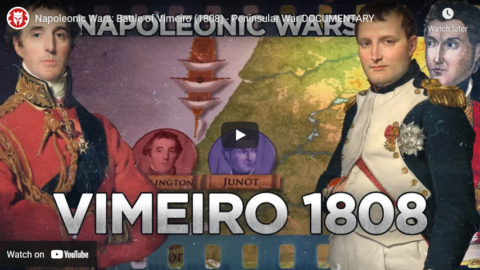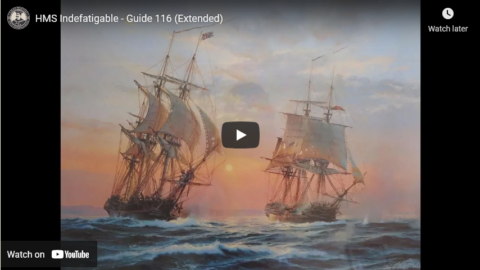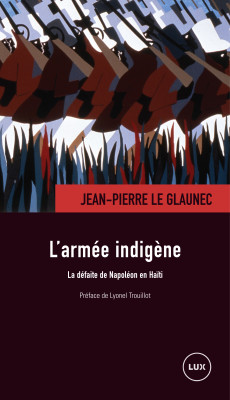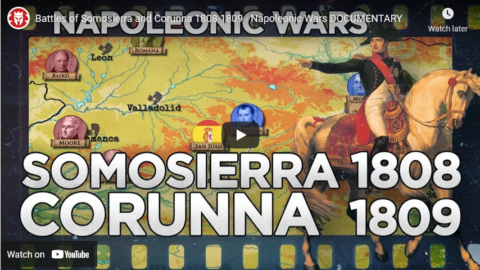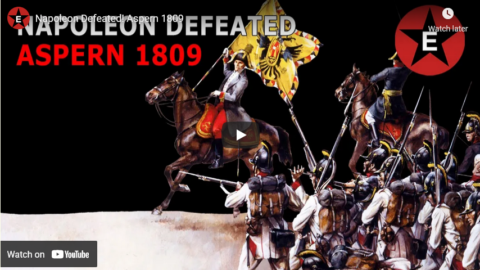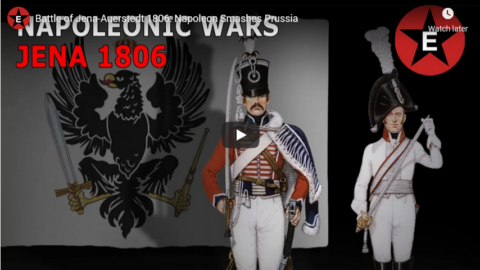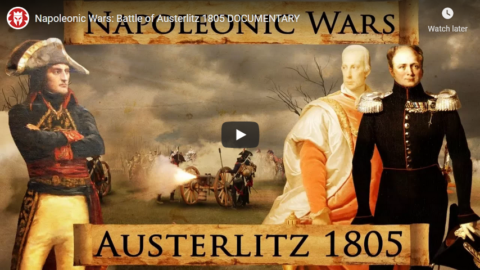Historia Civilis
Published 29 Jan 2022Patreon | http://historiacivilis.com/patreon
Donate | http://historiacivilis.com/donate
Merch | historiacivilis.com/merch
Mailing List | http://historiacivilis.com/mailinglist
Twitter | http://historiacivilis.com/twitter
Website | http://historiacivilis.comSources:
Wolfram Siemann, Metternich: Strategist and Visionary | https://amzn.to/3Glc5c8
Eric Hobsbawm, The Age of Revolution, 1789-1848 | https://amzn.to/3zOQWV4
Adam Zamoyski, Rites of Peace: The Fall of Napoleon and the Congress of Vienna | https://amzn.to/3zSpcir
Richard J. Evans, The Pursuit of Power: Europe 1815-1914 | https://amzn.to/3qhFE8G
A. Wess Mitchell, The Grand Strategy of the Habsburg Empire | https://amzn.to/332Sorj
Robert K. Massie, Dreadnought: Britain, Germany, and the Coming of the Great War | https://amzn.to/3r6jllP
—
N. Gash, “After Waterloo: British Society and the Legacy of the Napoleonic Wars”, from Transactions of the Royal Historical Society, vol. 28, 1978, pp. 145-157. | https://www.jstor.org/stable/3679205
The Annual Register, 1815, Preface | https://hdl.handle.net/2027/mdp.39015…
Voltaire, “An Essay on Universal History, the Manners, and Spirit of Nations” | https://amzn.to/34BGbtL
The History of Parliament: The 5th Parliament of the United Kingdom | https://www.historyofparliamentonline…Music:
“Like,” by Nctrnm
“But Enough About Me Bill Paxton,” by Chris Zabriskie
“I Don’t See the Branches, I See the Leaves,” by Chris Zabriskie
“Orion,” by Josh Stewart
“CGI Snake,” by Chris Zabriskie
“Gown,” by Nctrnm
“Hallon,” by Christian BjoerklundWe are a participant in the Amazon Services LLC Associates Program, an affiliate advertising program designed to provide a means for us to earn fees by linking to Amazon.com and affiliated sites.
February 2, 2022
The Congress of Vienna (Part 1) (1814)
November 9, 2021
Napoleonic Wars: Siege of Zaragoza (1808) – Peninsular War
Kings and Generals
Published 30 Sep 2018
Our animated historical documentary series on the Napoleonic Wars are back with another episode covering the Peninsular War. The armies of Napoleon face more rebellions this time in Spain. And if the battle of Vimiero was crucial for the resistance in Portugal, the Siege of Zaragoza of 1808 played the similar role for the northern part of Spain. The battle of Bailen is just around the corner, and the Peninsular campaign will only get more interesting from here.This script was researched and written by Everett Rummage. Check out his brilliant Age of Napoleon podcast – http://bit.ly/2vC3cIE In our opinion, it is the best podcast on the Napoleonic era.
Support us on Patreon: http://www.patreon.com/KingsandGenerals or Paypal: http://paypal.me/kingsandgenerals
We are grateful to our patrons and sponsors, who made this video possible: https://drive.google.com/open?id=1KEV…
This video was narrated by Officially Devin (https://www.youtube.com/user/OfficiallyDevin)
Machinimas were made on NTW3 mod for Napoleon Total War by Malay Archer (https://www.youtube.com/user/Mathemed…)
✔ Merch store ► teespring.com/stores/kingsandgenerals
✔ Twitch ► https://www.twitch.tv/nurrrik_phoenix
✔ Twitter ► https://twitter.com/KingsGenerals
✔ Instagram ► http://www.instagram.com/Kings_GeneralsProduction Music courtesy of Epidemic Sound: http://www.epidemicsound.com
Napoleon Total War OST – “HMS Victory”
Napoleon Total War OST – “The Battle At Arcole”
Jon Björk – “Downfall 1”
Johannes Bornlöf – “Imperious 2”
Johannes Bornlöf – “Rise of the Phoenix 2”
Johannes Bornlöf – “Solemn”
Andreas Jamsheree – “Sunstorm 1”#Documentary #Kingsandgenerals #Napoleon
November 4, 2021
Napoleonic Wars: Battle of Vimeiro (1808) – Peninsular War
Kings and Generals
Published 12 Aug 2018Napoleonic Wars are back! It is 1807, and we find the Emperor of the French Napoleon Bonaparte at the height of his power, as he controls most of Europe after the War of the Fourth Coalition and the treaties of Tilsit. Napoleon decided to strangle his remaining enemy the United Kingdom economically by enacting Europe-wide Colonial Blockade, yet as Portugal defied him, he invaded it and then Spain. This was the beginning of the Peninsular War. Soon Spain and Portugal were in open rebellion. The first phase of the war ended when the British forces under Wellington landed in Portugal and fought the French General Junot at Vimeiro.
This script was researched and written by Everett Rummage. Check out his brilliant Age of Napoleon podcast – http://bit.ly/2vC3cIE In our opinion, it is the best podcast on the Napoleonic era.
Support us on Patreon: http://www.patreon.com/KingsandGenerals or Paypal: http://paypal.me/kingsandgenerals
We are grateful to our patrons and sponsors, who made this video possible: https://drive.google.com/open?id=1jjh…
This video was narrated by Officially Devin (https://www.youtube.com/user/OfficiallyDevin)
Machinimas were made on NTW3 mod for Napoleon Total War by Malay Archer (https://www.youtube.com/user/Mathemed…)
✔ Merch store ► teespring.com/stores/kingsandgenerals
✔ Twitch ► https://www.twitch.tv/nurrrik_phoenix
✔ Twitter ► https://twitter.com/KingsGenerals
✔ Instagram ► http://www.instagram.com/Kings_GeneralsProduction Music courtesy of Epidemic Sound: http://www.epidemicsound.com
#Documentary #Kingsandgenerals #Napoleon
September 15, 2021
QotD: The cult of Napoleon
The worship of Napoleon has always been a French mystery. Is it spontaneous, reflecting nostalgia for empire, or something organized by the state, which has inherited from that period a matchless taste for authority? French schoolchildren are taught only the benefits of the emperor’s reign. According to our textbooks, Napoleon is supposed to have endowed France with a perfect legal system that still governs us today and to have caused the winds of freedom to blow across Europe. Each year, a dozen more books are published in France touting Napoleon’s glory. He has been represented more often than Christ on film, always as a positive hero.
Other Europeans see him very differently. While French historians amplify the myth that Napoleon himself created by dictating his idealized Memoires on St. Helena, English, German, Russian and Spanish authors count up the massacres and the destruction of their cities and their civilization.
Napoleon began shaping his reputation while he was still alive. He commonly wrote reports of his victories before the battles had even begun, which makes him the founding father of fake news. Certain disasters, such as the Battle of Eylau (now in Poland) against the Russians and Prussians, for example, are still inscribed in the walls of the Arc de Triomphe in Paris as if they were victories, since that is how they were first announced.
Since France is now part of Europe — rather than Europe becoming part of France, as Napoleon wished — what should we commemorate? French victories, such as Austerlitz, were defeats for the Russians and Austrians. Waterloo, a day of mourning for the French, is a symbol of liberation for the British, Germans, and Dutch. In any case, since the return of Napoleon’s ashes, our view of history has changed; the fate of people concerns us more than the fate of armies. Napoleon’s stature does not benefit from this change of perspective. To finance his wars, he ruined Europe, banning international commerce (only smugglers got rich), conscripting peasants, ravaging harvests, and confiscating horses. How should we commemorate the Russian and German campaigns of 1812 and 1813, when the Grand Army left in its wake not the liberation of peoples, but famine and epidemic? Worst still, how should we commemorate the restoration of slavery in the French Antilles, Guadeloupe, and Santo Domingo (Haiti), where the deputies of France’s Revolutionary Convention had abolished it in 1794?
Guy Sorman, “Which Napoleon?”, City Journal, 2021-05-14.
August 20, 2021
HMS Indefatigable – Guide 116 (Extended)
Drachinifel
Published 6 Apr 2019HMS Indefatigable, a razee frigate of the British Royal Navy, is today’s subject.
Want to support the channel? – https://www.patreon.com/Drachinifel
Want to talk about ships? https://discord.gg/TYu88mt
Want to get some books? www.amazon.co.uk/shop/drachinifel
August 18, 2021
QotD: Napoleon Bonaparte
Wednesday [May 5th] marks the 200th anniversary of the death of the French Emperor Napoleon Bonaparte, who was, depending on who you’re listening to, either a wily Corsican bandit who rose to dominate Europe through force and terror, or a messiah of liberalism who de-medievalized the continent. Whichever view you buy, Napoleon’s unique vis viva is still felt strongly in the world today. Any strong history undergrad ought to be able to chart a path from Napoleon through his nephew and successor Napoleon III, to what A.J.P. Taylor called “the period of the German wars” (ending in 1945), to the present moment.
The French Republic still uses Napoleonic touches in its mythmaking, as do its politicians. Sweden’s crown is still worn by descendants of Bernadotte, a general who was of humble birth but proved the ultimate champion of the emperor’s bizarre game of thrones. Napoleon said of his army that every man in it carried a marshal’s baton in his knapsack. By the same token, every ambitious colonel who ever plotted to pull together a squadron of tanks and overthrow a president carries a little portrait of Napoleon I next to his bosom. It may not be fair to say that Napoleon bears part of the responsibility for Hitler, but if there had been no Napoleon there could not possibly have been a Hitler. It is probably one of those “necessary cause” vs. “sufficient cause” things that give people so much trouble.
The bicentenary of Napoleon’s lonely death in custody on a windblown South Atlantic island has given the English an excuse to refresh some of their most precious and whimsical tokens of victory. At Apsley House, the home of the 1st Duke of Wellington, art restorers have been giving special attention to a bronze copy of Napoleon’s death mask, which was taken in plaster after the emperor expired. It’s a mesmerizing totem: to our eyes, the face emphasizes the Italian character that the ci-devant Buonaparte struggled to elude and conceal on the way to becoming master of France. Death masks seem creepy to us today, but they speak in ways a portrait cannot.
Colby Cosh, “Will There Be Cake?”, NP Platformed, 2021-05-05.
August 11, 2021
QotD: Wellington and Napoleon
But the most important of the great men who at this time kept Britain top nation was an Irishman called John Wesley, who afterwards became the Duke of Wellington (and thus English). When he was still Wolseley, Wellington made a great name for himself at Plassaye, in India, where he
“Fought with his fiery few and one,”
remarking afterwards, “It was the bloodiest battle for numbers I ever knew.” It was, however, against Napoleon and his famous Marshals (such as Marshals Ney, Soult, Davos, Mürren, Soult, Blériot, Snelgrove, Ney, etc.) that Wellington became most memorable. Napoleon’s armies always used to march on their stomachs, shouting: “Vive l’Intérieur!” and so moved about very slowly (ventre-à-terre, as the French say), thus enabling Wellington to catch them up and defeat them. When Napoleon made his troops march all the way to Moscow on their stomachs they got frozen to death one by one, and even Napoleon himself admitted afterwards that it was rather a Bad Thing.
Gorilla War in Spain
The second part of the Napoleonic War was fought in Spain and Portugal and was called the Gorilla War on account of the primitive Spanish method of fighting.
Wellington became so impatient with the slow movements of the French troops that he occupied himself drawing imaginary lines all over Portugal and thus marking off the fighting zone; he made a rule that defeats beyond these lines did not count, while any French army that came his side of them was out of bounds. Having thus insured himself against disaster, Wellington won startling victories at Devalera, Albumina, Salamanda, etc.
Waterloo
After losing this war Napoleon was sent away by the French, since he had not succeeded in making them top nation; but he soon escaped and returned just in time to fight on the French side at the battle of Waterloo. This utterly memorable battle was fought at the end of a dance, on the Playing Fields of Eton, and resulted in the English definitely becoming top nation. It was thus a very Good Thing. During the engagement the French came on in their usual creeping and crawling method and were defeated by Wellington’s memorable order, “Up Jenkins and Smashems”.
This time Napoleon was sent right away for ever by everybody, and stood on the deck of a ship in white breeches with his arms like that.
W.C. Sellar & R.J. Yeatman, 1066 And All That, 1930.
August 9, 2021
1815 Eruption of Mount Tambora
The History Guy: History Deserves to Be Remembered
Published 6 May 2020In 1815, the volcano Mount Tambora on the island of Sumbawa in the Dutch East Indies erupted in the most explosive volcanic eruption in human history. The explosion affected the world’s climate, changing history in surprising ways. The History Guy recalls the forgotten history of the year without a summer.
This is original content based on research by The History Guy. Images in the Public Domain are carefully selected and provide illustration. As very few images of the actual event are available in the Public Domain, images of similar objects and events are used for illustration.
You can purchase the “offshore” bow tie worn in this episode at The Tie Bar:
https://www.thetiebar.com/?utm_campai…All events are portrayed in historical context and for educational purposes. No images or content are primarily intended to shock and disgust. Those who do not learn from history are doomed to repeat it. Non censuram.
Find The History Guy at:
Patreon: https://www.patreon.com/TheHistoryGuy
The History Guy: History Deserves to Be Remembered is the place to find short snippets of forgotten history from five to fifteen minutes long. If you like history too, this is the channel for you.
Awesome The History Guy merchandise is available at:
teespring.com/stores/the-history-guyScript by THG
#volcano #thehistoryguy #history
From the comments:
The History Guy: History Deserves to Be Remembered
11 months ago
A viewer complained that much of the footage of volcanoes were volcanoes dissimilar to Tambora. Notably, Tambora is a stratovolcano. Lava from stratovolcano eruptions tends to be very viscous and cools quickly, whereas much of the footage in the episode is from shield volcanos in Hawaii, which produce free-flowing lava. Please understand that I can only use media in the Public Domain. I did not mean to misinform the audience by using the available footage and photographs.
July 22, 2021
QotD: Nelson
Napoleon ought never to be confused with Nelson, in spite of their hats being so alike; they can most easily be distinguished from one another by the fact that Nelson always stood with his arm like this, while Napoleon always stood with his arms like that.
Nelson was one of England’s most naval officers, and despised weak commands. At one battle when he was told that his Admiral-in-Chief had ordered him to cease fire, he put the telephone under his blind arm and exclaimed in disgust: “Kiss me, Hardy!”
By this and other intrepid manoeuvres the French were utterly driven from the seas.
W.C. Sellar & R.J. Yeatman, 1066 And All That, 1930.
July 15, 2021
Haitian independence was bought with blood … a lot of blood
Theodore Dalrymple recently read a book by Sherbrooke University professor Jean-Pierre Le Glaunec on the Battle of Vertières which ended Napoleon’s attempt to recapture the island and re-enslave the population:
Haiti is one of those countries that you can leave after a visit, but that never quite leaves you. Its history is so heroic and so tragic, its present condition often so appalling, its culture so fascinating and its people so attractive, that even if it does not become the main focus of your intellectual attention, you never quite lose your interest in it, or in its history.
That is why, recently in a Parisian bookshop, I bought a book about the Battle of Vertières, the last gasp of the expedition sent out by Napoleon to Haiti, or Saint-Domingue as it was still known (“The Pearl of the Antilles” by those who profited from it), to return it to the condition of a vast slave plantation. General Leclerc, Napoleon’s brother-in-law, commanded, and 50,000 French soldiers, including Leclerc, lost their lives in this ill-fated and, from our current moral standpoint, malign expedition. Six weeks after its final defeat at the hands of the former slaves, Haiti, or Hayti — under the first of its many dictators, Jean-Jacques Dessalines, who made himself emperor and was assassinated two years later — declared its independence from France.
The book, titled L’Armée indigène, “The Native Army”, was by a French historian, Jean-Pierre Le Glaunec, who now teaches at Sherbrooke University in Quebec. The book recounts not only the history of the battle itself, which took place on 18 November 1803, but how it has been remembered, or forgotten (especially in France), in the subsequent two centuries, and the purposes to which the memory has been put.
The author is a specialist in Haitian and American history. His fundamental historical outlook is very different from mine, but that did not reduce my pleasure in his book, for he writes well and marshals much interesting evidence, the fruit of diligent original research in primary sources. And it seems to me that no one can fail to be moved by the heroism and determination of the former slaves to defend their newfound freedom from the attempt to return them to servitude. The slave colony of Saint-Domingue had been among the cruellest ever known; the methods of Napoleon’s expeditionary army grew more and more vicious as it suffered repeated decimations. That history has its ironies — it is possible that, had the slave revolution failed, Haiti would now be more prosperous than it is, like Guadeloupe or Martinique — does not detract from the righteousness of the cause of the former slaves. They could not be expected to foresee the two centuries of failure, poverty, and oppression to come. Besides, the dignity conferred by the victory cannot be simply set against its deleterious long-term material consequences: Man does not live by GDP alone.
The rest of the article delves into Professor Le Glaunec’s other recent book on George Floyd’s death and fails to show the same intellectual honesty and willingness to face unpleasant facts that his Haitian history demonstrates.
In other words, Professor Le Glaunec, who makes much of his dispassionate resort to historical evidence by contrast with his opponent, reveals himself to be at least as parti pris as that opponent. He displays a lack of curiosity about George Floyd that surely derives from his political standpoint. As for the dedication to the memory of George Floyd, it is morally obtuse: for a man does not become good by being wrongfully killed. A mother loves her son because he is her son, not because he is good, and therefore the grief of his family is understandable and easily sympathised with; but for others to turn him into what he was not, a martyr to a cause, is to display at once a moral and an intellectual defect.
The connection between historical explanation and individual morality is nowhere more complex than in Haiti. The victor of Vertières, the former slave Dessalines, was declared dictator for life, with the right to choose his successor, in the very document that announced the independence of Haiti and the freedom of its population. Dessalines then undertook a policy that today would be called genocide: he ordered that every white settler, man, woman, and child killed (about 6000 in all) who remained in the country after the last of the French troops should be killed, and his orders were carried out. The truly atrocious conduct of the French explained this genocide no doubt, but did it justify it? To answer in the affirmative is to claim that there are good, or justified, genocides; to answer no is to be accused of a lack of psychological insight into the righteous anger of Dessalines and others, or of a lack of sympathy for the state of mind of the victims of slavery.
The death of George Floyd was similarly wrong; but that does not mean that the reaction to it was right.
March 27, 2021
Battles of Somosierra and Corunna 1808-1809 – Napoleonic Wars
Kings and Generals
Published 17 Feb 2019We are continuing our historical animated documentary series on the Napoleonic Wars with another episode on the Peninsular War, covering the battles of Somosierra and Corunna. Napoleon attempted to take back Madrid and crush the British resistance led by General Moore.
This script was researched and written by Everett Rummage. Check out his brilliant Age of Napoleon podcast – http://bit.ly/2vC3cIE In our opinion, it is the best podcast on the Napoleonic era.
Support us on Patreon: http://www.patreon.com/KingsandGenerals or Paypal: http://paypal.me/kingsandgenerals
We are grateful to our patrons and sponsors, who made this video possible: https://drive.google.com/open?id=1Jlq…
This video was narrated by Officially Devin (https://www.youtube.com/user/OfficiallyDevin)
Machinimas were made on NTW3 mod for Napoleon Total War by Malay Archer (https://www.youtube.com/user/Mathemed…)
✔ Merch store ► teespring.com/stores/kingsandgenerals
✔ Podcast ► Google Play: http://bit.ly/2QDF7y0 iTunes: https://apple.co/2QTuMNG
✔ Twitter ► https://twitter.com/KingsGenerals
✔ Instagram ► http://www.instagram.com/Kings_GeneralsProduction Music courtesy of Epidemic Sound: http://www.epidemicsound.com
#Documentary #Kingsandgenerals #Napoleon
March 19, 2021
Napoleon Defeated! Aspern 1809
Epic History TV
Published 9 May 2019In 1809, with Napoleon and his best troops bogged down in Spain, Austria decided to try to get revenge for her humiliation at Austerlitz three years before. Archduke Charles led an invasion of France’s ally Bavaria, but Napoleon raised fresh troops and transformed the strategic situation in four days of hard fighting along the Danube. But having taken Vienna, Napoleon’s overconfidence led to a desperate battle at Aspern-Essling, resulting in his first major defeat as Emperor, and the death of his closest friend.
With thanks to HistoryMarche, check out his channel here: https://www.youtube.com/channel/UC8MX…
Get early access & vote for future topics at Patreon https://www.patreon.com/epichistorytv
Find Osprey books on the Napoleonic Wars https://ospreypublishing.com/
Recommended books on the Napoleonic Wars (as an Amazon Associate I earn from qualifying purchases):
Eggmühl 1809: Storm Over Bavaria https://geni.us/mRvuG
Aspern & Wagram 1809 https://geni.us/4wewlr
French Napoleonic Infantryman 1803-15 https://geni.us/ivLojZD
British Light Infantry & Rifle Tactics of the Napoleonic Wars https://geni.us/02ycFR4
Tactics and the Experience of Battle in the Age of Napoleon https://geni.us/mKAYz
Napoleon the Great http://geni.us/NqMWMusic from Filmstro: https://filmstro.com/?ref=7765
Get 20% off an annual license with this exclusive code:EPICHISTORYTV_ANN#EpicHistoryTV #NapoleonicWars #Napoleon
March 15, 2021
Battle of Jena-Auerstedt 1806: Napoleon Smashes Prussia
Epic History TV
Published 28 Aug 2018Fresh from his great victory at Austerlitz, Napoleon’s next campaign saw him take on Prussia in the autumn of 1806. Prussia’s army had been feared throughout Europe since the days of Frederick the Great, but in just 5 weeks of “Napoleonic Blitzkrieg”, the French Emperor showed that those days were long gone.
Start your FREE trial with The Great Courses Plus here: http://ow.ly/Fq9R30kFTgf
Get early access and a vote on future topics by supporting Epic History TV on Patreon: https://www.patreon.com/epichistorytv
With thanks to HistoryMarche, check out his channel here: https://www.youtube.com/channel/UC8MX…
Learn more about the Napoleonic Wars with books from our co-production partner Osprey Publishing (as an Amazon Associate I earn from qualifying purchases):
Jena 1806 http://geni.us/C8ieSe
Napoleon’s Cuirassiers & Carabiniers http://geni.us/AZ4nWU
Prussian Cavalry of the Napoleonic Wars http://geni.us/xepcMusic from Filmstro: https://filmstro.com/?ref=7765
Get 20% off an annual license with this exclusive code:EPICHISTORYTV_ANN#EpicHistoryTV #NapoleonicWars #Napoleon
“The Great Courses Plus is currently available to watch through a web browser to almost anyone in the world and optimized for the US, UK, and Australian markets. The Great Courses Plus is currently working to both optimize the product globally and accept credit card payments globally.”
February 25, 2021
QotD: Islam and the impact of the Enlightenment
In private, however, or when addressing his soldiers, Napoleon was contemptuous of the Islamic word. “You have come to this country,” he told his army before the battle of the Pyramids, “to save the inhabitants from barbarism, and to bring civilisation to the Orient.” This was why, in addition to muskets, cannon and cavalry, he had brought with him to Egypt a printing press, a hot-air balloon and a small army of intellectuals.
The blaze of the Enlightenment, although it might seem to have been lit in Europe, was not just for Europeans. All the world had the potential to share in its radiance. Illumination was the same wherever it manifested itself, and this meant that in Peking as in Paris, in Baghdad as in Bordeaux, there were sages more than qualified to rank alongside Voltaire and Diderot.
The Enlightenment, far from ranking as something parochial and culturally contingent, was properly a global phenomenon. These various dogmas, which the philosophes had tended to take for granted, had then been given a new and militant edge by the French Revolution. That religion was superstition; that rights were universal; that equality, individual liberty and freedom of expression were simultaneously natural and sacred: these were the convictions that had inspired in the citizens of revolutionary France their continent-shaking sense of certitude. Thrones had been toppled; abbeys demolished; the detritus of a benighted past erased. And if in Europe, then why not further afield? The Rights of Man were for everyone, after all, or they were nothing. “Any law that violates them,” as Robespierre had put it, “is fundamentally unjust and tyrannical. Indeed, it is not law at all.”
This sense of missionary purpose, which inspired in those who felt it an ambition to bring the entire world from darkness into light, outlasted the execution of Robespierre, the defeat of Napoleon, the seeming triumph of reaction across post-revolutionary Europe. In 1854, when the Ottoman Empire was facing a critical threat from Russia, France joined Britain in insisting as a condition of its entry into the Crimean War that the slave trade across the Black Sea be abolished.
Also abolished was the jizya, a tax on Jews and Christians that reached back to the very beginnings of Islam, and was directly mandated by the Qur’an. Such measures, to the Ottomans, risked immense embarrassment. The effect, after all, was to reform Islamic jurisprudence according to the standards of non-believers. It was, for Muslim traditionalists, an ominous straw in the wind. Over the course of the century and more that followed, the weathering effects of Western hegemony on the practices that Muslims believed they had inherited from Muhammad — the Sunnah — became more and more pronounced.
Tom Holland, “The age-old tension between Islam and France”, UnHerd, 2020-11-02.
February 20, 2021
Napoleonic Wars: Battle of Austerlitz 1805
Kings and Generals
Published 19 Nov 2017We are continuing our documentary series on the Napoleonic Wars and this time we are covering the land portion of the War of the Third Coalition (1805) in which Napoleon faced the forces of Britain, Russia, Austria and Naples. This video depicts the overall campaign and the battles of Ulm and Austerlitz, both of which are considered some of the finest in the career of the French Emperor. The strategic and tactical moves made during these battles are still taught in the military schools and rightly so — Napoleon Bonaparte proved that he was the best general of his time.
Support us on Patreon: http://www.patreon.com/KingsandGenerals or Paypal: http://paypal.me/kingsandgenerals
We are grateful to our patrons, who made this video possible: Ibrahim Rahman, Koopinator, Daisho, Łukasz Maliszewski, Nicolas Quinones, William Fluit, Juan Camilo Rodriguez, Murray Dubs, Dimitris Valurdos, Félix Gagné-Dion, Fahri Dashwali, Kyle Hooton, Dan Mullen, Mohamed Thair, Pablo Aparicio Martínez, Iulian Margeloiu, Chet, Nick Nasad, Jeyares, Amir Eppel, Thomas Bloch, Uri Sternfeld, Juha Mäkelä, Georgi Kirilov, Mohammad Mian, Daniel Yifrach, Brian Crane, Muramasa, Gerald Tnay, Hassan Ali, Richie Thierry, David O’Hare, Christopher Commins, Chris Glantzis, Mike, William Pugh, Stefan Dt, indy, Bashir Hammour, Mario Nickel and R.G. Ferrick.
This video was narrated by good friend Officially Devin. Check out his channel for some kick-ass Let’s Plays. https://www.youtube.com/user/OfficiallyDevin
The Machinimas for this video are created by one more friend – Malay Archer. Check out his channel, he has some of the best Total War machinimas ever created: https://www.youtube.com/user/Mathemed…
✔ Twitch ► https://www.twitch.tv/nurrrik_phoenix
✔ Twitter ► https://twitter.com/KingsGenerals
✔ Instagram ► https://www.instagram.com/nurrrrrik
✔ Steam ► http://steamcommunity.com/id/nurrrikInspired by: BazBattles, Invicta (THFE), Epic History TV, Historia Civilis and Time Commanders
Machinimas made on the Napoleon Total War
Production Music courtesy of Epidemic Sound, Total War Napoleon OST: http://www.epidemicsound.com
Songs used:
Total War Napoleon OST – “Napoleonic Code”
Rannar Sillard – “Identity Crisis”
Hakan Ericsson – “Darkness closing in”
Total War Napoleon OST – “The Battle at Arcole”
Total War Napoleon OST – “Naval Battle at St. Vincent”
Five Armies
Total War Napoleon OST – “From Egypt to France”

